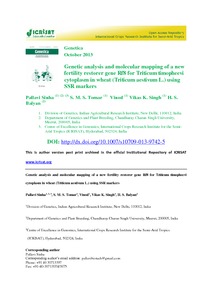Genetic analysis and molecular mapping of a new fertility restorer gene Rf8 for Triticum timopheevi cytoplasm in wheat (Triticum aestivum L.) using SSR markers
Abstract
A study on mode of inheritance and mapping of fertility restorer (Rf) gene(s) using simple sequence repeat (SSR) markers was conducted in a cross of male sterile line 2041A having Triticum timopheevi cytoplasm and a restorer line PWR4099 of common wheat (Triticum aestivum L.). The F1 hybrid was completely fertile indicating that fertility restoration is a dominant trait. Based on the pollen fertility and seed set of bagged spikes in F2 generation, the individual plants were classified into fertile and sterile groups. Out of 120 F2 plants, 97 were fertile and 23 sterile (based on pollen fertility) while 98 plants set ≥5 seeds/spike and 22 produced ≤4 or no seed. The observed frequency fits well into Mendelian ratio of 3 fertile: 1 sterile with χ2 value of 2.84 for pollen fertility and 2.17 for seed setting indicating that the fertility restoration is governed by a single dominant gene in PWR4099. The three linked SSR markers, Xwmc503, Xgwm296 and Xwmc112 located on the chromosome 2DS were placed at a distance of 3.3, 5.8 and 6.7 cM, respectively, from the Rf gene. Since, no known Rf gene is located on the chromosome arm 2DS, the Rf gene in PWR4099 is a new gene and proposed as Rf8. The closest SSR marker, Xwmc503, linked to the Rf8 was validated in a set of Rf, maintainer and cytoplasmic male sterile lines. The closely linked SSR marker Xwmc503 may be used in marker-assisted backcross breeding facilitating the transfer of fertility restoration gene Rf8 into elite backgrounds with ease

